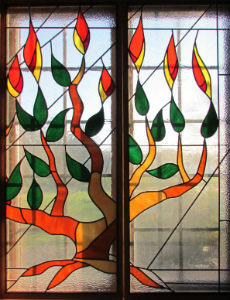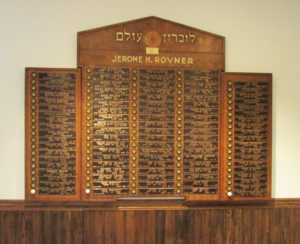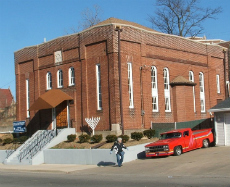
Current Exhibits
The museum’s long-term and changing exhibits feature photos and artifacts from the Iowa Jewish Historical Society’s permanent collection as well as borrowed artifacts in special displays. When you visit the museum, be sure to tour the following featured exhibits.
Food in Jewish Life
The Food in Jewish Life exhibit focuses on the importance and role of food in Jewish life:
- Why food is an important part of Jewish tradition and daily living?
- What is kosher?
- What are the traditional foods associated with particular Jewish holidays—Passover, Hanukkah, Yom Kippur, and Rosh Hashanah?
- What is the meaning of other foods served at life events such as bat and bar mitzvahs, weddings, and funerals?
The exhibit features artifacts from the IJHS collection—including examples of American Jewish cookbooks, like the Settlement Cookbook series that started in 1901 out of a need to raise funds to support the Settlement House in Milwaukee, WI. Here at the Settlement House, Jewish immigrants from Eastern Europe, as well as other immigrants, were “helped along the road of Americanization” as they learned about nutrition, sanitary conditions, and more—as they were at Des Moines’ own Jewish Settlement House.
After your visit, continue to learn about Jewish food traditions at home when you pick up a copy of our first cookbook, Beyond Matzo Balls: Celebrating 100 Years of Jewish Cooking in Iowa.
The Yahrzeit Boards from Marshalltown, IA
Your visit isn’t complete without viewing the memorial boards from the Sons of Israel Congregation in Marshalltown, IA. The congregation was established in 1920 and dissolved in 1985. The congregation’s Memorial Boards were first moved to Tifereth Israel Synagogue and then were donated to the IJHS in 2013.
At the time of donation, the boards were showing their age and needed restoration before they could be displayed. Tom Press and Donna Paulsen very generously donated the funds needed to restore these important artifacts of Jewish history in Iowa. Restoring the Memorial Boards involved a painstaking, 6-month process done by trained conservators at the Ford Conservation Center in Omaha. Photos documenting the restoration process are part of the exhibit.
From Distant Places to Dubuque’s Shores: 175 Year of Jewish Presence
This exhibit celebrates the unique role that Dubuque’s Jewish community played in the history of the city and the state of Iowa. It tells the story of Alexander Levi, a French Jew of Spanish descent who emigrated to the United States and arrived in Iowa in 1833—the same year Dubuque was founded. Levi’s story parallels that of many immigrant entrepreneurs of different nationalities who made good and then took leading roles as philanthropists in their communities. What makes his story unique is that fact that he was the first foreigner to become a naturalized citizen of Iowa.
Levi started as a fur trader and then turned his talents to creating a thriving grocery business before becoming a successful miner and mine provisioner. In 1847, he opened what would become one of the most successful retail stores of his time. In addition to his successful business life, Levi was a leader of Dubuque’s Jewish community, founding the first two Jewish congregations in Dubuque and purchasing land for a Jewish cemetery.
Beth El Jacob Synagogue Stained-Glass Windows

Four historic stained-glass windows from Beth El Jacob Synagogue in Des Moines are now on display. Originally designed and made for the synagogue by Marty Grund and his business partner/artist Alan McDermott, the windows are an integral part of the building’s history that is now being preserved at the IJHS. We are deeply grateful to the Beth El Jacob congregation for donating the windows and to Marty for donating his time to clean and stabilize the windows for display in the museum.
Beth El Jacob was founded in 1885, with the congregation first meeting in a rented hall above a business at East 2nd and Walnut Streets. In 1893, the congregation bought the Evangelical Church at East 2nd and Des Moines Streets, which served as their home for the next thirty years—until they moved to 5th Street and University Avenue in 1923. After a fire gutted the building in 1956, the congregation moved once more, this time to Cummins Parkway, with the new synagogue opening on April 25, 1957.
In 1983, Ron “Uby” Rabinovitz approached Marty about designing stained-glass windows for the sanctuary. This commission was the catalyst for Grund to start his own business, The Stained Glass Store, with co-founder Alan McDermott. Marty continued designing and installing stained-glass windows in the synagogue until the building was sold. The windows were donated to the IJHS in 2016 at the time of the sale.
B’nai Jacob Synagogue Display
On May 19, 2018, B’nai Jacob Synagogue in Ottumwa, Iowa held its last Torah service. Established in 1898, B’nai Jacob was originally an Orthodox congregation. In the 1950s, the congregation joined the Conservative movement.
The synagogue was constructed in 1915 at a time when several hundred people regularly attended services and were active in the congregation. During the last decade, the number of people in the congregation decreased to just a few who were able to attend services on a regular basis. In May, the decision was made to dissolve the congregation. The building, which was listed on the National Register of Historic Places in 2004, is being donated to a local civic arts group. The Yahrzeit boards are now on display at Iowa City and the Torahs have been donated to other congregations, including a new congregation in Paraguay.
To save other parts of its history, the B’nai Jacob board donated numerous items to the Iowa Jewish Historical Society, including the 1915 curtains for the Ark, a pew, yarmulke stand, menorah, prayer books, school desk and chair, historic photos, and more. The pew, yarmulke stand, and student desk and chair are now on display in the museum.


